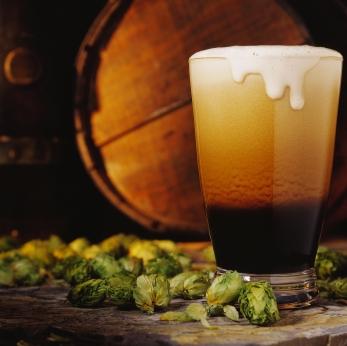
There are beer drinkers who enjoy virtually every kind of brew there is and others who are very loyal to a particular style of beer or even a specific brand of beer. For many beer lovers, this comes down to a preference for lighter or darker beers and opinions are very strong on both sides among those who go for one or the other.
Regardless of whether or not youre a fan of dark beer, one thing you may not be aware of is exactly what makes the difference between say, a light lager or a the darkest of chocolate stouts. In essence, what is it that makes dark beer dark? If youre interested in finding out more about this issue or even if you dont know your pilsners from your porters, then youve come to the right place keep reading to find out how dark beer comes by its distinctive color.
Its All In The Grain
Its true that it is the grain that really makes the difference in the color of the finished beer; this is true whether the beer is made in a large scale brewery or in your own kitchen with a beer brewing kit. Of course, most beer is made from the same grain (barley), though youll find others brewed with wheat, oats, rye, rice, quinoa and virtually any other grain you can name, all of which impart their own character (and color) to the brew.
However, what really makes all the difference in the color and body of a beer, since most beers are brewed with barley is how darkly the malt has been roasted. The darker the roast, the darker the beer that results from this ingredient.
The roast affects the color of the finished beer as well as the body and many of the flavors in the brew as well. For example, a dark beer tends to have a deeper, more complex set of flavors which include notes of chocolate and toffee flavors which come from primarily from the malt. By contrast, a lighter beer is characterized by flavors which are dominated by the hops refreshing bitterness, floral and fruity notes from the hops and to a lesser extent, yeast.
Of course, when you have your own beer brewing kit, you can choose exactly which kind of beer youd like to brew. There are no rules about what you can and cannot make and you may even find yourself becoming a fan of styles of beer which you never saw yourself enjoying before. Such is the wonder of making your own homebrew.
If you want to stay on top of Quality Wine & Ale Supply's newest content, then:


 There are beer drinkers who enjoy virtually every kind of brew there is and others who are very loyal to a particular style of beer or even a specific brand of beer. For many beer lovers, this comes down to a preference for lighter or darker beers and opinions are very strong on both sides among those who go for one or the other.
Regardless of whether or not youre a fan of dark beer, one thing you may not be aware of is exactly what makes the difference between say, a light lager or a the darkest of chocolate stouts. In essence, what is it that makes dark beer dark? If youre interested in finding out more about this issue or even if you dont know your pilsners from your porters, then youve come to the right place keep reading to find out how dark beer comes by its distinctive color.
There are beer drinkers who enjoy virtually every kind of brew there is and others who are very loyal to a particular style of beer or even a specific brand of beer. For many beer lovers, this comes down to a preference for lighter or darker beers and opinions are very strong on both sides among those who go for one or the other.
Regardless of whether or not youre a fan of dark beer, one thing you may not be aware of is exactly what makes the difference between say, a light lager or a the darkest of chocolate stouts. In essence, what is it that makes dark beer dark? If youre interested in finding out more about this issue or even if you dont know your pilsners from your porters, then youve come to the right place keep reading to find out how dark beer comes by its distinctive color.

